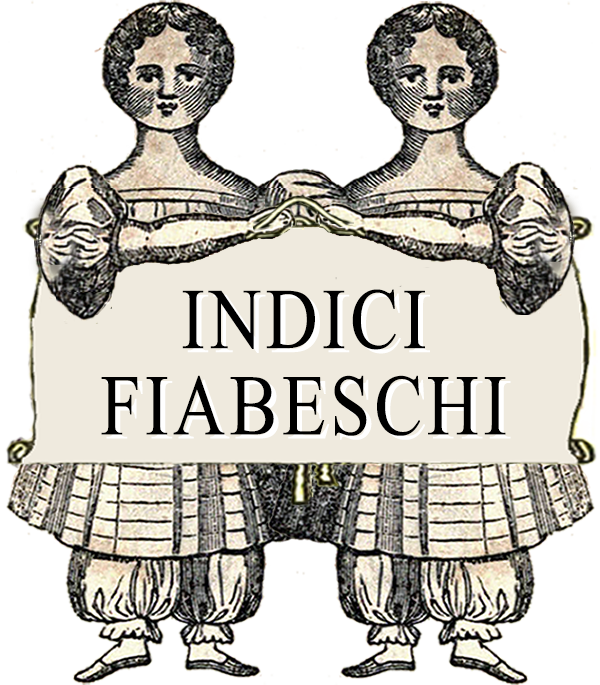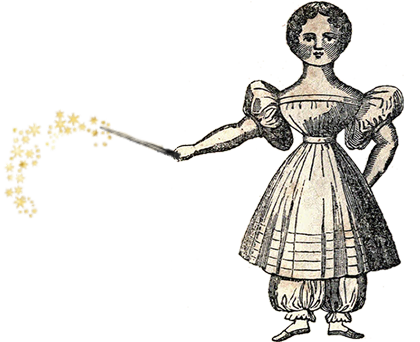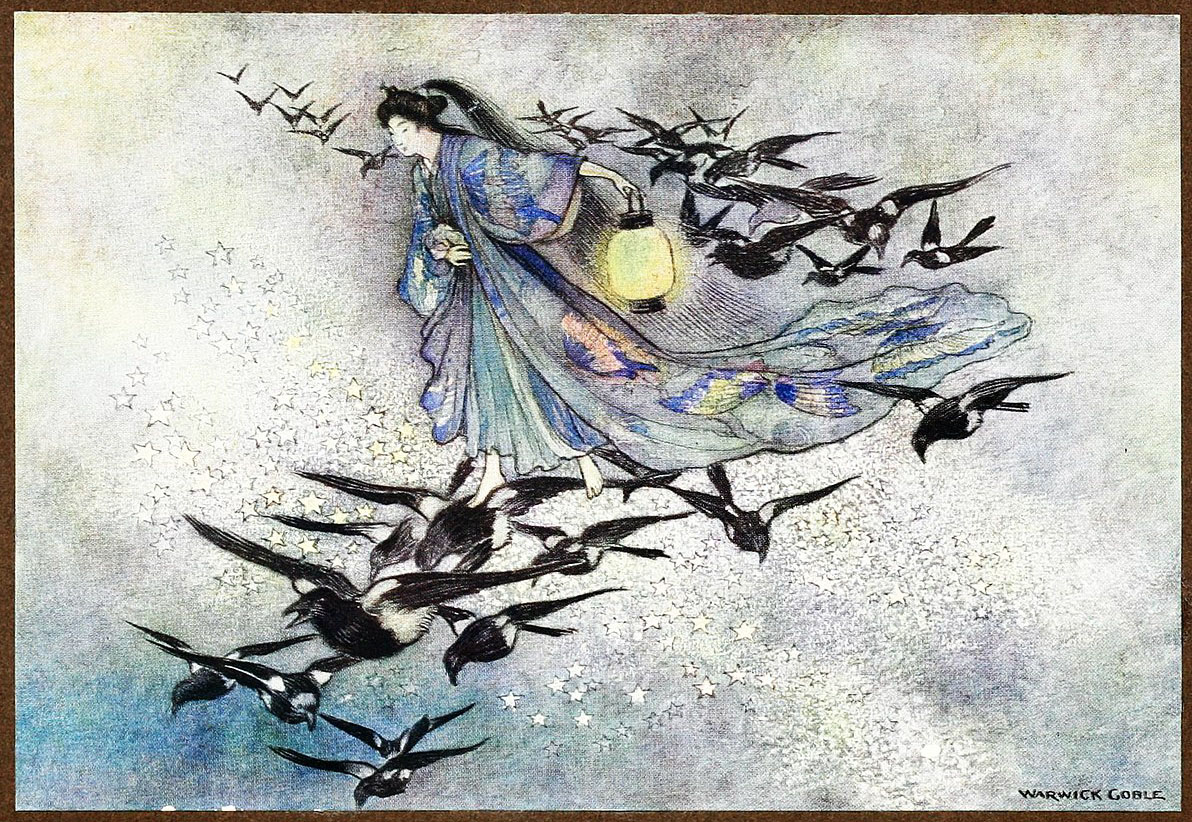|
| ll you that are true
lovers, I beseech you pray the gods for fair weather
upon the seventh night of the seventh moon. For patience' sake and for dear love's sake, pray, and be pitiful that upon that night there may be neither rain, nor hail, nor cloud, nor thunder, nor creeping mist. Hear the sad tale of the Star Lovers and give them your prayers. |
Vi supplico, se
siete veri amanti, di pregare gli dei perché concedano
bel tempo nella settima notte della settima luna. Per la salvezza della pazienza e per la salvezza del vero amore, abbiate pietà, e pregate perché quella notte non ci siano pioggia, né grandine, né nuvole, né tuoni né nebbia che si addensa. Sentite la triste storia degli amanti delle stelle e concedete loro le vostre preghiere. |
| The Weaving Maiden
was the daughter of a Deity of Light. Her dwelling was
upon the shore of the Milky Way, which is the Bright
River of Heaven. All the day long she sat at her loom
and plied her shuttle, weaving the gay garments of the
gods. Warp and woof, hour by hour the coloured web grew
till it lay fold on fold piled at her feet. Still she
never ceased her labour, for she was afraid. She had
heard a saying: «Sorrow,
age-long sorrow, shall come upon the Weaving Maiden when
she leaves her loom». So she laboured, and the gods had garments to spare. But she herself, poor maiden, was ill-clad; she recked nothing of her attire or of the jewels that her father gave her. She went barefoot, and let her hair hang down unconfined. Ever and anon a long lock fell upon the loom, and back she flung it over her shoulder. She did not play with the children of Heaven, or take her pleasure with celestial youths and maidens. She did not love or weep. She was neither glad nor sorry. She sat weaving, weaving ... and wove her being into the many-coloured web. |
La Divina Tessitrice
era la figlia del Dio della Luce. La sua dimora era
sulla riva della Via Lattea, che è il Fiume Lucente del
Cielo. Per tutto il giorno sedeva al telaio e faceva
correre la navetta, tessendo i vivaci abiti degli dei.
Trama e ordinto, ora dopo ora la tela colorata cresceva
fino a quando piega dopo piega cadendo non formava un
bel mucchio ai suoi piedi. Ma non smetteva mai il suo
lavoro, perché aveva paura. Era venuta a sapere di una
profezia: «Dolore, un dolore infinito, cadrà sulla
Divina Tessitrice appena lascerà il suo telaio». E così la Fanciulla Tessitrice lavorava, e le dee e gli dei avevano abiti in sovrappiù. Ma lei, povera giovane, era malvestita; non si curava del suo abbigliamento né dei gioielli che suo padre le regalava. Andava scalza, e i lunghi capelli erano sciolti e incolti. Di tanto in tanto una lunga chiave cadeva sul telaio, e lei se lo gettava dietro le spalle. Non era triste né felice. Sedeva e tesseva, tesseva... e tesseva il suo essere nella tela multicolore. |
| Now her father, the
Deity of Light, grew angry. He said, " Daughter, you weave too much." "It is my duty," she said. " At your age to talk of duty! " said her father. " Out upon you! " "Wherefore are you displeased with me, my father?" she said, and her fingers plied the shuttle. "Are you a stock or a stone, or a pale flower by the wayside?" "Nay," she said, " I am none of these." "Then leave your loom, my child, and live; take your pleasure, be as others are." " And wherefore should I be as others are? " she said. " Never dare to question me. Come, will you leave your loom? " She said, " Sorrow, age-long sorrow, shall come upon the Weaving Maiden when she leaves her loom." " A foolish saying," cried her father, " not worthy of credence. What do we know of age- long sorrow? Are we not gods? " With that he took her shuttle from her hand gently, and covered the loom with a cloth. And he caused her to be very richly attired, and they put jewels upon her and garlanded her head with flowers of Paradise. And her father gave her for spouse the Herd Boy of Heaven, who tended his flocks upon the banks of the Bright River. |
A un certo punto suo
padre, il Dio della Luce, si arrabbiò. Le disse: - Figlia, tu tessi troppo. - È il mio dovere, - rispose lei. - Alla tua età parli di dovere! - disse il padre - Non è da te! - Per quale ragione, padre mio, siete disgustato nei miei riguardi? - disse lei, e le sue dita muovevano la navetta. - Sei un pezzo di legno o un sasso, o un fiore pallido sul margine della via? - No - disse lei, - nulla di simile. - Allora lascia il telaio, mia piccola, e vivi! prendi ciò che ti piace, sii come tutti gli altri. -E perché dovrei essere come tutti gli altri? - disse lei. - Non osare contraddirmi. Suvvia, vuoi lasciare il telaio? Lei disse: - Dolore, dolore lungo un secolo cadrà sulla Fanciulla Tessitrice quando lascerà il telaio. - Parole assurde - gridò suo padre - da non prendere in considerazione. Cosa mai sappiamo di dolori lunghi un secolo? Forse che non siamo dei? E con queste parole le prese gentilmente dalla mano la navetta, e coprì il telaio con un panno. Poi fece in modo che fosse riccamente vestita, e la ornarono con gioielli e inghirlandarono il suo capo con fiori del Paradiso. Infine suo padre la diede in sposa al Giovane Pastore del Cielo che pascolava le sue greggi sulle rive del Fiume Lucente. |
| Now the Maiden was
changed indeed. Her eyes were stars and her lips were
ruddy. She went dancing and singing all the day. Long
hours she played with the children of Heaven, and she
took her pleasure with the celestial youths and maidens.
Lightly she went; her feet were shod with silver. Her
lover, the Herd Boy, held her by the hand. She laughed
so that the very gods laughed with her, and High Heaven
re-echoed with sounds of mirth. She was careless; little
did she think of duty or of the garments of the gods. As
for her loom, she never went near it from one moon's end
to another. " I have my life to live," she said; " I'll weave it into a web no more." And the Herd Boy, her lover, clasped her in his arms. Her face was all tears and smiles, and she hid it on his breast. So she lived her life. But her father, the Deity of Light, was angry. " It is too much," he said. " Is the girl mad? She will become the laughing-stock of Heaven. Besides, who is to weave the new spring garments of the gods? " Three times he warned his daughter. Three times she laughed softly and shook her head. " Your hand opened the door, my father," she said, " but of a surety no hand either of god or of mortal can shut it." He said, " You shall find it otherwise to your cost." And he banished the Herd Boy for ever and ever to the farther side of the Bright River. The magpies flew together, from far and near, and they spread their wings for a frail bridge across the river, and the Herd Boy went over by the frail bridge. And immediately the magpies flew away to the ends of the earth and the Weaving Maiden could not follow. She was the saddest thing in Heaven. Long, long she stood upon the shore, and held out her arms to the Herd Boy, who tended his oxen desolate and in tears. Long, long she lay and wept upon the sand. Long, long she brooded, looking on the ground. |
Ora la Fanciulla era
profondamente cambiata. I suoi occhi erano stelle e le
sue labbra erano rosse. Tutto il giorno camtava e
danzava. Per molte ore giocava con i bambini del
Paradiso, e passava ore felici con i giovani e le
giovani celesti. Camminava leggera, ai suoi piedi
calzava scarpette d'argento. Il suo innamorato, il
Giovane Pastore, la teneva per mano. Lei aveva un riso
così bello che tutti gli dei ridevano insieme a lei, e
l'Alto Cielo echeggiava tutto di voci gioiose. Era
spensierata, pensava poco al dovere o alle vesti degli
dei. Al telaio poi non si avvicinava nemmeno, dalla fine
di una luna alla fine dell'altra. Così viveva la sua
vita. Ma suo padre, il Dio della Luce, era arrabbiato. - Ora è troppo, - disse. - Mia figlia è forse impazzita? Diventerà lo zimbello del Cielo. E poi, chi mai tesserà per gli dei le vesti di primavera? Tre volte aveva avvertito sua figlia. Tre volte lei aveva riso lievemente scuotendo il capo. - La tua mano ha aperto la porta, padre mio - disse - ma certamente nessuna mano, sia di un dio o di un mortale, potrà richiuderla. Allora il padre disse: - E allora dovrai scoprirlo a tue spese. Bandì per sempre il Giovane Pastore mandandolo nel luogo più lontano del Fiume Lucente. Le gazze giunsero tutte insieme, volando da vicino e da lontano, spiegarono le ali formando un fragile ponte sul fiume, e il Giovane Pastore passò sul fragile ponte. E immediatamente le gazze volarono via tornando sulla terra e la Giovane Tessitrice non poté seguirlo. Tanto, tanto tempo lei rimase sulla spiaggia, tendendo le sue braccia al Giovane Pastore, che pascolava i suoi buoi piangendo disperato. Era la creatura più triste del Cielo. Tanto, tanto tempo restò a piangere sulla sabbia. Tanto, tanto tempo rimase sola con i suoi pensieri, guardando a terra. |
| She arose and went
to her loom. She cast aside the cloth that covered it.
She took her shuttle in her hand. "Age-long sorrow," she said, "age-long sorrow! " Presently she dropped the shuttle. " Ah," she moaned, " the pain of it," and she leaned her head against the loom. But in a little while she said, " Yet I would not be as once I was. I did not love or weep, I was neither glad nor sorry. Now I love and I weep I am glad, and I am sorry." Her tears fell like rain, but she took up the shuttle and laboured diligently, weaving the garments of the gods. Sometimes the web was grey with grief, sometimes it was rosy with dreams. The gods were fain to go strangely clad. The Maiden's father, the Deity of Light, for once was well pleased. " That is my good, diligent child," he said. " Now you are quiet and happy." " The quiet of dark despair," she said. " Happy! I am the saddest thing in Heaven." " I am sorry," said the Deity of Light; " what shall I do? " " Give me back my lover." " Nay, child, that I cannot do. He is banished for ever and ever by the decree of a Deity, that cannot be broken." " I knew it," she said. " Yet something I can do. Listen. On the seventh day of the seventh moon, I will summon the magpies together from the ends of the earth, and they shall be a bridge over the Bright River of Heaven, so that the Weaving Maiden shall lightly cross to the waiting Herd Boy on the farther shore." |
Si alzò e andò al
telaio. Tolse il panno che lo copriva. Prese in mano la
navetta. «Pena senza fine» si disse «pena senza fine!» In quel momento lasciò cadere la navetta. «Ahi!» mormorò «questa pena!» E chinò il capo sul telaio. Ma subito dopo si disse: «Ma non voglio essere quella di prima. Non amavo né piangevo, non ero felice né triste. Ora amo e piango e sono felice, e sono triste». Le sue lacrime cadevano fitte come la pioggia, ma lei prese la navetta e lavorò diligentemente, tessendo le vesti degli dei. A volte la tela era grigia di dolore, a volte era rosea di sogni. Gli dei amavano indossare abiti strani. Il padre della Fanciulla, Dio della Luce, per una volta era soddisfatto. - Ecco la mia buona volonterosa figlia, - disse - Ora sei calma e felice. - La calma della nera disperazione - disse lei. - Felice! Sono io la cosa più triste del Cielo. - Mi dispiace - disse il Dio della Luce - cosa posso fare? - Rendimi il mio amato, - No, bambina mia, questo non posso farlo. È bandito per sempre da un divino decreto, che non può essere cancellato. - Lo sapevo - disse lei. - Ma c'è qualcosa che posso fare. Ascolta. Il settimo giorno della settima luna chiamerò a raccolta le gazze che formeranno un ponte sul Fiume Lucente del Cielo, cosicché la Fanciulla Tessitrice possa lievemente attraversare e raggiungere il Pastore Fanciullo sulla riva più lontana. |
| So it was. On the seventh
day of the seventh moon came the magpies from far
and near. And they spread their wings for a frail
bridge. And the Weaving Maiden went over by the
frail bridge. Her eyes were like stars, and her
heart like a bird in her bosom. And the Herd Boy
was there to meet her upon the farther shore. And so it is still, oh, true lovers upon the seventh day of the seventh moon these two keep their tryst. Only if the rain falls with thunder and cloud and hail, and the Bright River of Heaven is swollen and swift, the magpies cannot make a bridge for the Weaving Maiden. Alack, the dreary time! Therefore, true lovers, pray the gods for fair weather. |
Così fu. Il settimo
giorno della settima luna vennero le gazze da vicino e
da lontano. E spiegarono le ali formando un fragile
ponte. Così la Fanciulla Tessitrice passava sul fragile
ponte. Aveva gli occhi luminosi come stelle, e il cuore
in petto come un uccello. E il Fanciullo Pastore era là
ad aspettarla sulla riva più lontana. E così accade ancora oggi, i due veri innamorati nel settimo giorno della settima luna hanno il loro incontro segreto. Solo se la pioggia cade con tuoni e nuvole e grandine, e il Fiume Lucente del Cielo è in piena e pieno di vortici, le gazze non possono fare un ponte per la Fanciulla Tessitrice. Ahimè, tempo tremendo! Per questo, veri innamorati, pregate gli dei che concedano il bel tempo. |
| _______________________________________ |
|
| TESTO |
|
| _______________________________________ | |
| TRADUZIONE | © Adalinda Gasparini 2021. |
| _______________________________________ | |
| IMMAGINI | La Fanciulla Tessitrice attraversa il
ponte delle gazze nel settimo giorno della settima
luna: Warwick Goble, p. 64; vedi/see TESTO |
| _______________________________________ NOTE |
|



